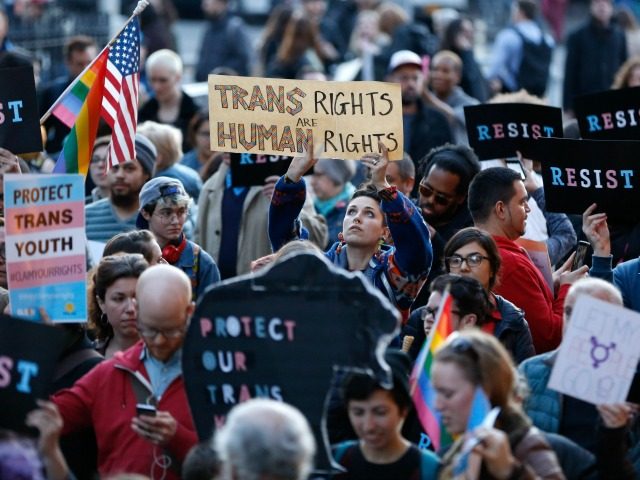A bill that would ban mental health professionals from helping gender-confused children and adolescents feel comfortable with their biological sex is being pushed by radical transgender activists in Massachusetts.
Titled “An Act Relative to Abusive Practices to Change Sexual Orientation and Gender Identity in Minors,” the bill states:
Under no circumstances shall a licensed professional advertise for or engage in sexual orientation and gender identity change efforts with a patient less than 18 years of age.
Andrew Beckwith, the president of Massachusetts Family Institute (MFI), testified Tuesday against the bill, asserting it would “remove the ability of children and their parents to receive desired counseling from licensed mental health professions to help address unwanted sexual attractions and gender confusion.”
Beckwith added the legislation places mental health professionals in precarious ethical dilemmas because they would be “forced to choose between violating the law and violating their ethical obligations for client treatment.”
As Fox25 in Boston reports, two prior attempts to pass the measure in the Bay State stalled in committee. Similar bills banning so-called conversion or reparative therapy have recently passed in both Connecticut and Rhode Island.
State Rep. Kay Khan (D), who introduced the legislation in Massachusetts, says the bill will protect young people.
“This practice is harmful to the mental and physical health of minors,” she said. “We want to make sure they’re in a healthy and medically-sound situation that doesn’t foster an environment of prejudice and discrimination.”
Taylor Fogarty, a libertarian lesbian who writes about feminism and politics, however, says bans on reparative therapy are “tragic.”
“Children who are feeling dysphoric in their gender should see a therapist,” she told Breitbart News in an interview. “I don’t think the point of that therapy should be to confirm that delusion. Transgenderism is a dysphoria.”
Fogarty continues:
In any other case in which you see people feeling uncomfortable or horrified or unfamiliar in their own body, it’s a form of dysphoria. Children should be able to see a therapist to help them ease this dysphoria. Laws against conversion therapy are setting up children to be miserable and to never get them the help they need because mainstream media is telling them they’re trans.
According to a press release at MFI, a number of therapists and other professionals testified against the bill.
“H.1190 is in fact child abuse,” said David Pickup, a licensed marriage and family therapist and expert on reparative therapy. He said the bill would “violate the rights of heterosexual children to receive therapy specifically for unwanted homosexual feelings caused by sexual abuse from pedophiles.”
Dr. Michelle Cretella, president of the American College of Pediatricians, submitted a statement in which she warned of other health risks associated with the measure:
HB 1190 requires therapists affirm young children with gender dysphoria as transgender which guarantees minors will be permanently sterilized under the guise of treating a condition that would otherwise resolve in up to 95% of them with therapy that either affirms biological sex or promotes watchful waiting. This is criminal.
“According to the DSM-V, as many as 98% of gender confused boys and 88% of gender confused girls eventually accept their biological sex after naturally passing through puberty,” the College asserts. “Conditioning children into believing that a lifetime of chemical and surgical impersonation of the opposite sex is normal and healthful is child abuse.”
Though supporters of the legislation claim it will decrease the risk of suicide for LGBT youth, MFI points to the case of Walt Heyer, who underwent gender reassignment surgery in the late 1980s.
“Six years into my life as a woman, I attempted suicide,” he said. “Thanks to some extensive and effective psychotherapy my transgender feelings dissipated completely. After eight years of living as a woman, I joyfully returned to my male gender over twenty years ago.”
Youth Trans Critical Professionals — a group of self-described “left-leaning, open-minded, and pro-gay rights” professionals say it is risky to affirm young people who claim to be transgender and provide them with hormonal and surgical treatments to change their bodies.
“Our concern is with medical transition for children and youth,” say Youth Trans Critical Professionals on their website. “We feel that unnecessary surgeries and/or hormonal treatments which have not been proven safe in the long-term represent significant risks for young people.”
The professionals express “alarm” that, because of the current trendiness of being transgendered, many young people have decided they are a member of the opposite sex simply as a result of “binges” on social media sites. They describe a process of transgender activists recruiting these young people for their “cult.”
“There is evidence that vulnerable young people are being actively recruited and coached on such sites to believe that they are trans,” the professionals say.
Despite such potential mental health problems associated with gender confusion, children who claim to be the opposite sex are now no longer legally permitted to see a therapist to get stabilizing “conversion therapy” in some states. Youth Trans Critical Professionals sees such state prohibitions as dangerous since they may block the process of critical thinking and evaluation of the young person regarding the reasons why he or she desires to become a transgender member of the opposite sex.
“While the sentiment behind this legislation is laudable, in some cases, it is being interpreted to mean that therapists cannot explore gender identity with a youth who is professing to be trans,” argue the professionals. “This would mean we can’t ask why; we can’t explore underlying mental health issues; we can’t consider the symbolic nature of the gender dysphoria; and we can’t look at possible confounding issues such as social media use or social contagion.”

COMMENTS
Please let us know if you're having issues with commenting.